Morrolinux: Linux on Apple Silicon – Surpassing Expectations
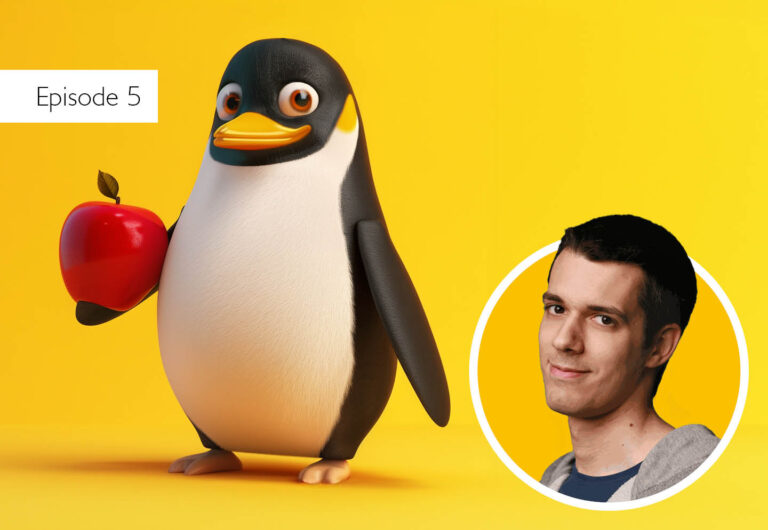
Linux’s adaptability is well-known, with its ability to run on a myriad of architectures forming a testament to its flexibility. The journey of porting Glu Linux to Apple Silicon M1 highlights this adaptability. Initial reactions were mixed, with some questioning the logic behind installing Linux on a Mac. However, the combination of Apple Silicon M1’s hardware efficiency and relative affordability presented a compelling case for Linux enthusiasts.
The Beginnings: Growing Pains and The Role of Community
Initially, the compatibility of Linux with Apple Silicon was a work in progress. Key components such as Bluetooth, speakers, and GPU acceleration were missing, limiting the usability of Asahi Linux in everyday scenarios. Despite these challenges, the project, led by Hector Martin (AKA marcan), made significant progress, largely due to community support on platforms such as Patreon.
The community played indeed a crucial role in the project’s development. Notable contributors such as YouTuber Asahi Lina engaged in reverse engineering the GPU, sharing progress through live streams. This collaborative and open-source approach was pivotal in uncovering crucial traits of the hardware in the absence of official documentation from Apple.
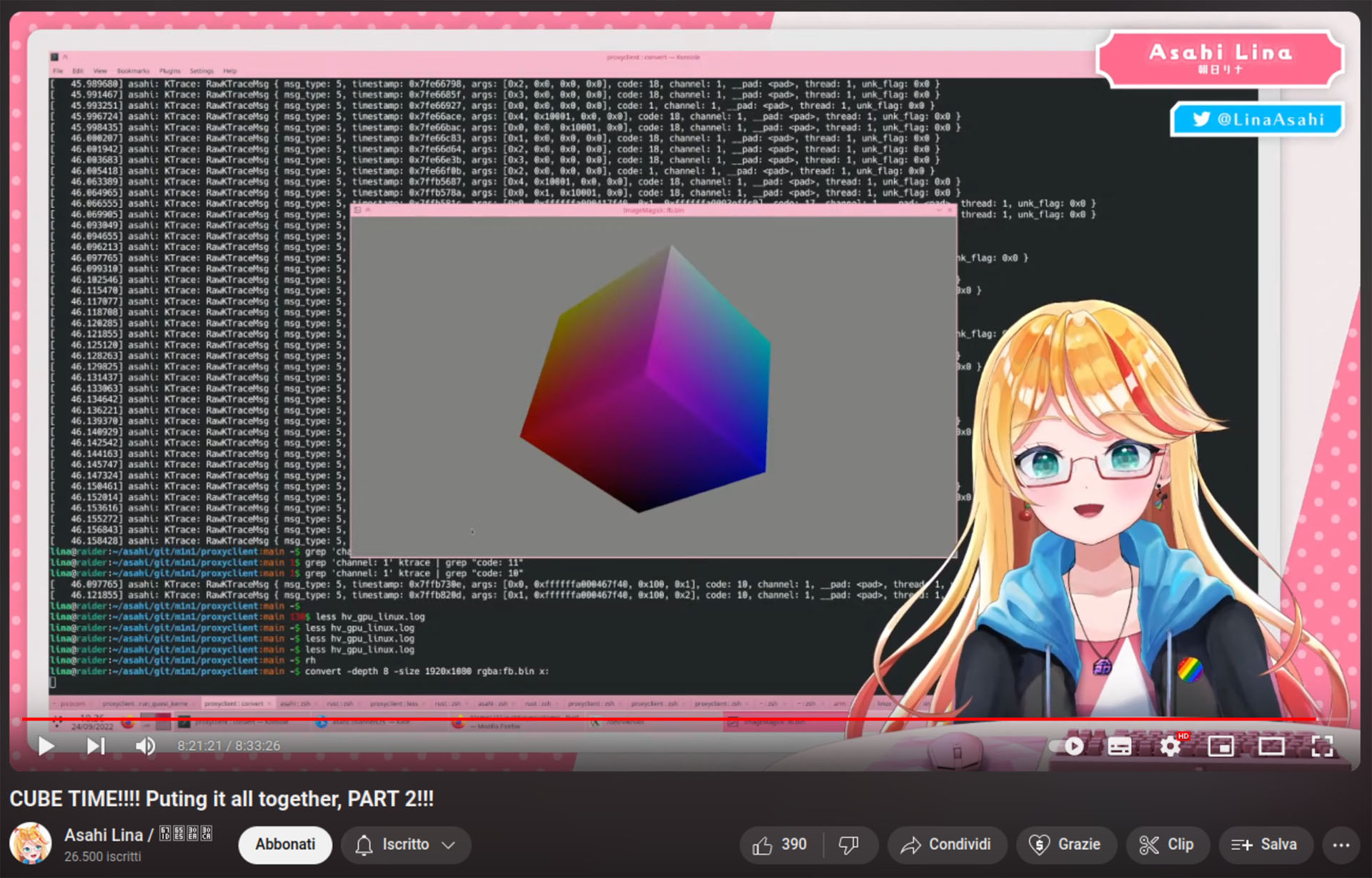
Asahi Lina running the first basic GPU accelerated demo
Major Milestones: From GPU Acceleration to Enhanced Audio Quality
One of the project’s significant achievements was the implementation of GPU drivers, supporting OpenGL 2.1 and OpenGL ES 2.0, along with OpenGL 3 and(a work in progress) Vulkan. This development enabled smoother operation of desktop environments and web browsers.
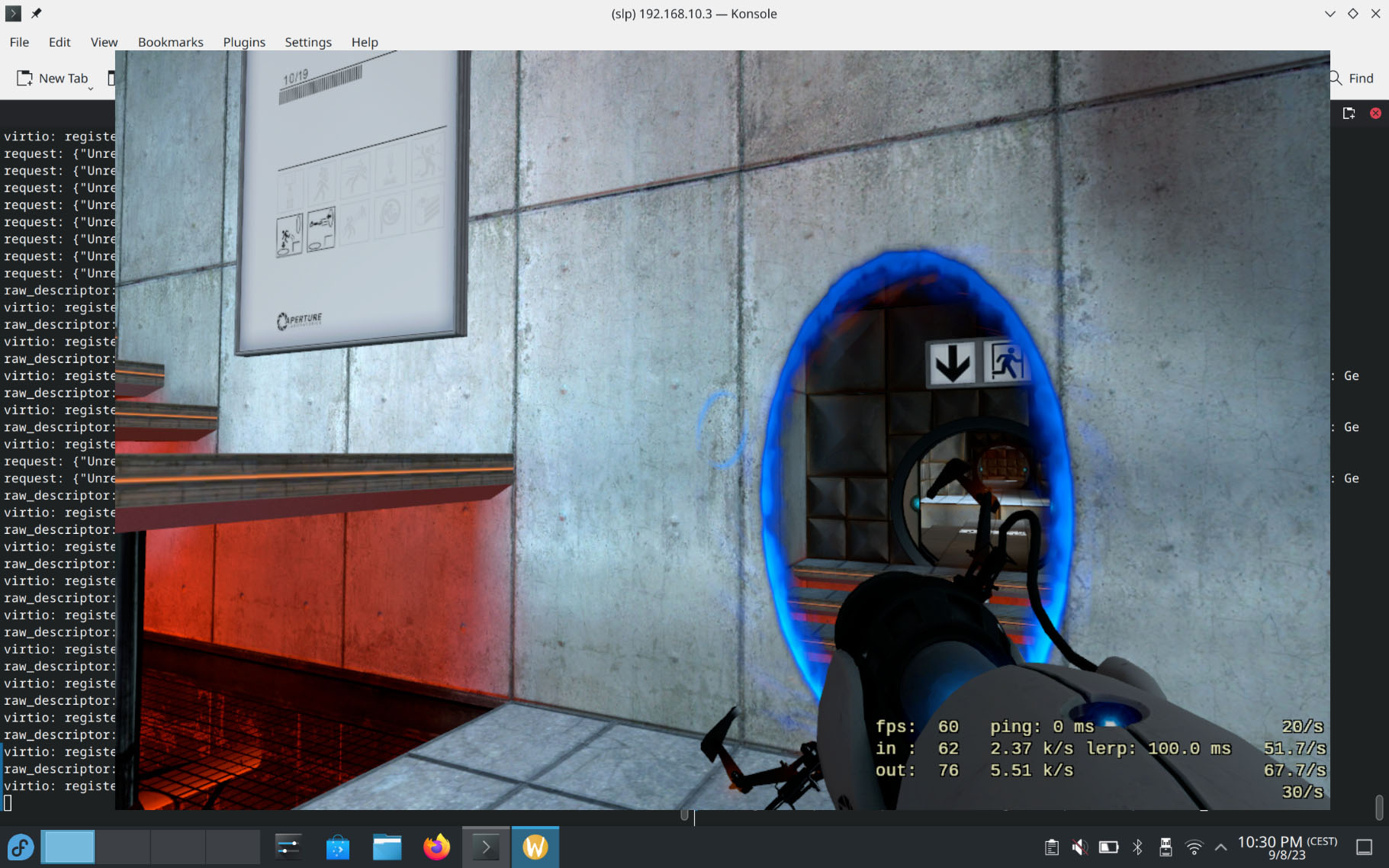
Portals opengl 3 running on steam under x86 emulation on an M1 machine
The collaboration between the Asahi Linux team and the PipeWire and Wire Plumber projects not only achieved unparalleled audio quality through speaker calibration on Linux laptops but also made broader contributions to the Linux audio ecosystem. By adhering to an “upstream first” policy, these improvements offer benefits beyond the Linux on Apple Silicon project, enhancing audio experiences across various platforms. Notably, this partnership introduced automatic loading of audio DSP filters for different hardware models, addressing a gap in the Linux audio stack for improved sound quality across devices.
The Rise of Remix and Full-Scale Support
The release of Fedora Asahi Remix marked a milestone in offering a stable version of Linux for Apple Silicon. This version streamlined the installation process, facilitating a dual-boot setup with MacOS. The release also boasted extensive hardware support, including novel features like the (also still a work in progress) Apple Neural Engine on M1 and M2 processors.
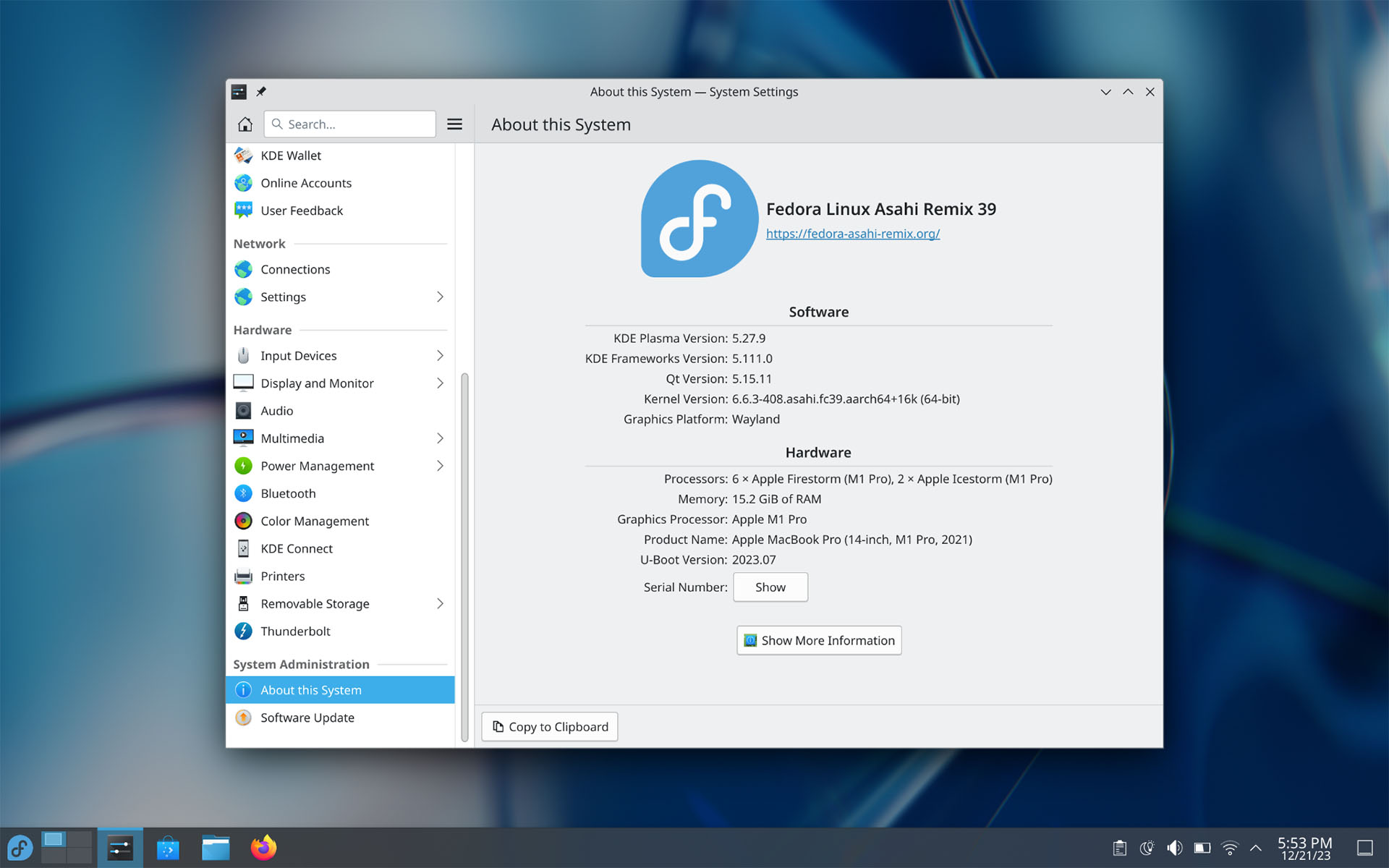
KDE about page on an M1 machine running Fedora
The Linuxified Apple Silicon: Progress and Prospects
Linux on Apple Silicon has shown remarkable progress, offering a user experience that rivals and, in some aspects, outshines MacOS. Most functionalities, including the keyboard backlight and webcam, operate smoothly.
Although further development is needed for complete microphone support and external display compatibility via USB-C and Thunderbolt, the overall performance is commendable. This rapid evolution highlights the strength of community-driven, open-source collaboration. With just two years since its inception, the project underscores the cooperative spirit of the Linux community. Anticipating the future, further improvements and wider adoption of Linux on Apple devices are expected, supported by continued development and active community; and if you are wondering if Linux on Apple Silicon is going to be better its performance on x86… Well: the answer is probably going to be – Yes! – soon…
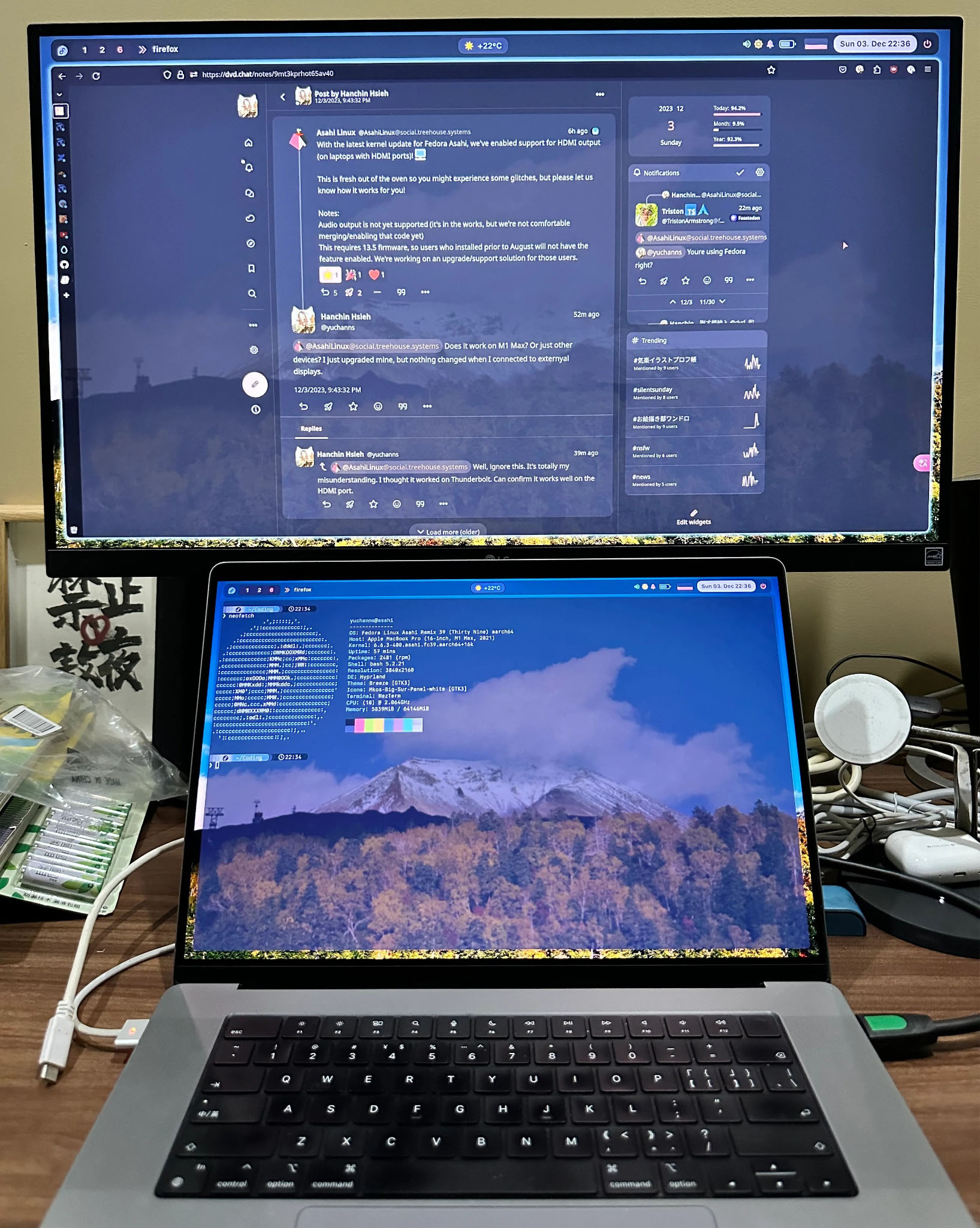
HDMI video output working on the M1 MacBook Pro
This article is a rework of Morrolinux’s video (in Italian) “CI SIAMO: Linux su Apple Silicon è MEGLIO che su x86” (Linux on Apple Silicon is BETTER than on x86).
About Moreno Razzoli:

Linux Professional Institute là một tổ chức phi lợi nhuận.
Linux Professional Institute (LPI) là tiêu chuẩn chứng nhận toàn cầu và tổ chức hỗ trợ nghề nghiệp cho các chuyên gia mã nguồn mở. Với hơn 250,000 người sở hữu chứng nhận, LPI là tổ chức chứng nhận Linux và mã nguồn mở đầu tiên và lớn nhất trên thế giới không thuộc về nhà cung cấp nào. LPI đã chứng nhận các chuyên gia tại hơn 180 quốc gia, cung cấp các kỳ thi bằng nhiều ngôn ngữ và có hàng trăm đối tác đào tạo.
Sứ mệnh của chúng tôi là thúc đẩy việc sử dụng mã nguồn mở bằng cách hỗ trợ những người làm việc với nó.
In case of a content discrepancy between English and the translation, the English version is canonical.
Spot a mistake or want to help improve this translation? Please let us know.
© Copyright 1999-2025 Linux Professional Institute Inc. All rights reserved.
Linux is a registered trademark of Linus Torvalds. Linux Professional Institute and corresponding “L” logo are registered trademarks.